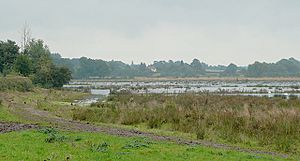Radford Meadows facts for kids
Quick facts for kids Radford Meadows |
|
|---|---|

Viewed from the north
|
|
| Lua error in Module:Location_map at line 420: attempt to index field 'wikibase' (a nil value). | |
| Location | near Stafford, Staffordshire |
| Area | 56 hectares (140 acres) |
| Operated by | Staffordshire Wildlife Trust |
Radford Meadows is a special place for nature, located near the town of Stafford in England. It's a nature reserve managed by the Staffordshire Wildlife Trust. This area is a floodplain, which means it's a flat piece of land next to a river. It sits between the River Penk and the Staffordshire and Worcestershire Canal.
Exploring Radford Meadows
You can visit Radford Meadows by walking along the towpath of the Staffordshire and Worcestershire Canal. The towpath is a path next to the canal. It is raised up, giving you great views of the whole nature reserve.
The reserve covers a large area, about 56 hectares. That's like 78 football fields!
Why is it important?
Radford Meadows is part of the floodplain of the River Penk. This means it's a natural area that helps when there's a lot of rain. It can soak up extra water, which stops floods from happening in nearby towns.
Special Trees and Birds
At the southern end of the reserve, you can find special trees called black poplars. These trees are quite rare in England now. This is because many floodplains, where these trees like to grow, have been drained over hundreds of years. People drained them to create more land for farming.
To help keep water in Radford Meadows, some small dams have been built. These dams create shallow pools of water. These pools are perfect for certain types of birds.
Birds to Spot
The shallow pools are great for waders and wildfowl. Waders are birds that walk in shallow water, like lapwings and snipe. Wildfowl are birds like ducks and geese.
The people who manage the reserve hope that by keeping the right habitat, birds like lapwings and snipe will come back to breed here. They used to breed at Radford Meadows until the 1990s.
 | Emma Amos |
 | Edward Mitchell Bannister |
 | Larry D. Alexander |
 | Ernie Barnes |

